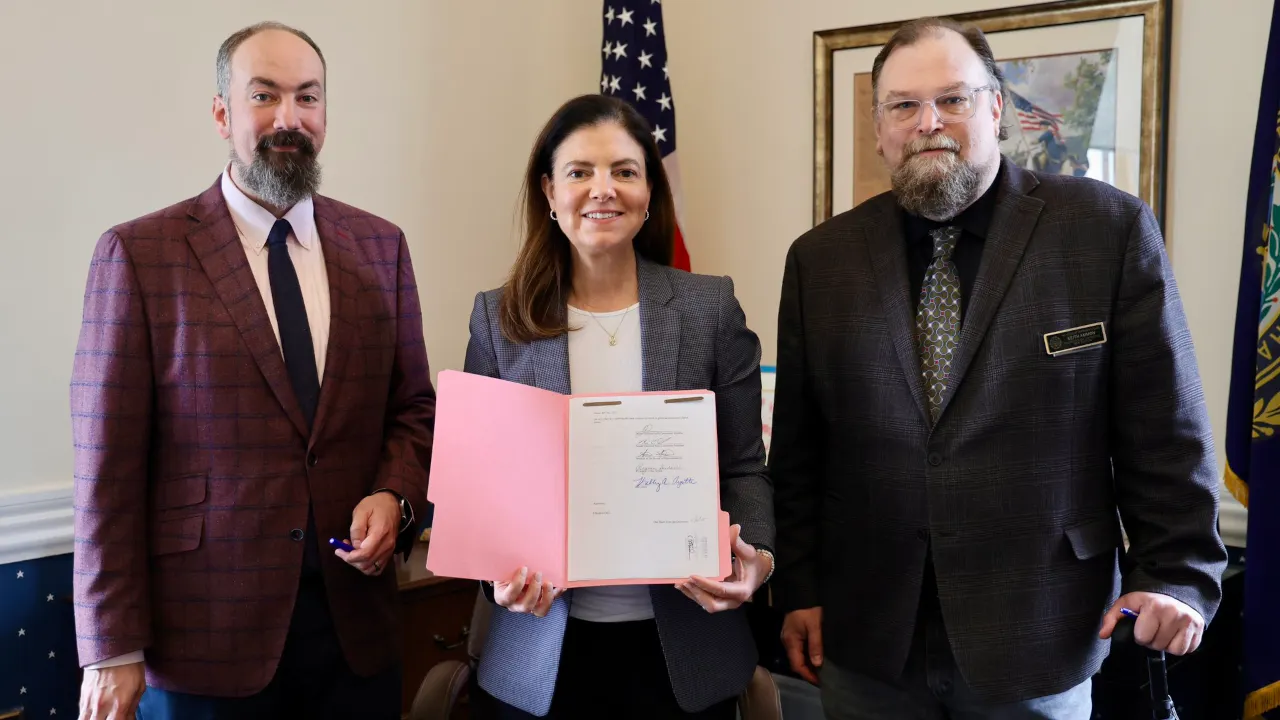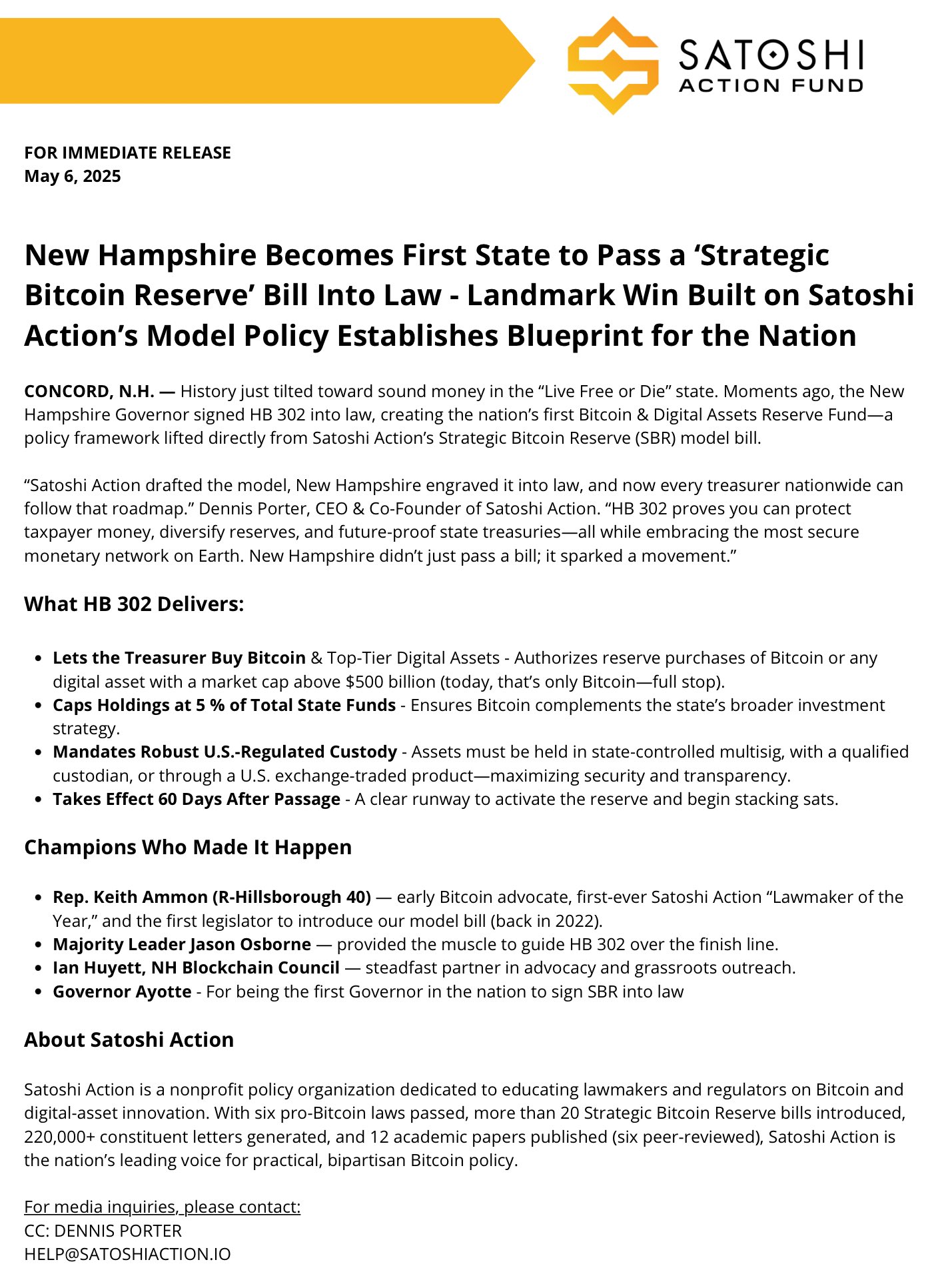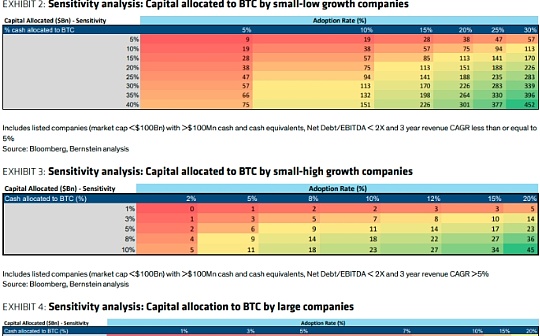Witness history: The first crypto reserve state in the United States makes a shocking debut, is the regular army buying coming?

転載元: panewslab
05/07/2025·4D
Milestones in the history of American finance
On May 7, 2025, New Hampshire left a strong mark in financial history. Gov. Kelly Ayotte signed the HB302 Act, making the state the first U.S. state to formally include cryptocurrencies — especially Bitcoin — into its strategic reserves. The groundbreaking bill, which will take effect 60 days, allows the state finance department to invest up to 5% of its public funds in digital assets with a market capitalization of more than $500 billion, as well as precious metals such as gold and silver. In the current market, only Bitcoin meets this standard with a market capitalization of about $1.88 trillion, making New Hampshire a pioneer in cryptocurrency mainstreaming.
The significance of this move is far beyond the state. It marks the U.S. government’s shift towards digital assets from skepticism to strategic adoption. As the first state to implement such policies, New Hampshire is not only testing the waters, but is boldly embracing a future where Bitcoin may be on par with traditional assets such as gold. This article will dig into the details of the HB302 Act, its potential economic impact, similar legislative progress in other states, and the broader significance of Bitcoin’s role in global finance.
Deconstructing HB302: A bold financial experiment
The HB302 bill was proposed by Republican Rep. Keith Ammon, who was narrowly passed in the state House by 192 to 179 and 4-1 on the Senate Committee after bipartisan support. The bill authorizes state finance ministers to invest up to 5% of public funds, including general funds and income stability funds, in eligible digital assets and precious metals. The initial proposal recommended 10% allocation, but in response to concerns about volatility and safety, the final version was downgraded to 5%.
The bill explicitly requires investment in assets with a market capitalization of more than $500 billion, making Bitcoin the only cryptocurrency that meets the standards, compared with the second-ranked Ethereum with a market capitalization of only about $214 billion. This targeting highlights that Bitcoin, as the only digital asset with scale and stability, is suitable for state-level investment. The bill also provides for secure custody, allowing assets to be held through state-controlled multi-signature wallets, qualified custodians or exchange-traded products to ensure robust security measures.

Potential purchasing power
New Hampshire's total budget for fiscal 2025 is approximately $15.4 billion, and general funds are approximately $5.6 billion. At a 5% cap, the state can spend $280 million to $770 million in investment in Bitcoin and precious metals. State Finance Minister Monica Mezzapelle said initial investment could be launched in a pilot form with a scale of about $180 million to test market responses and then gradually expand.
For ease of understanding, if New Hampshire invested $280 million per Bitcoin (according to reasonable estimates of recent market trends), about 2,947 Bitcoins can be purchased. If you invest US$770 million, you can purchase about 8,105 bitcoins, which is equivalent to 0.04% of the total circulation of 19.7 million bitcoins. Although small globally, this allocation will make New Hampshire a key institutional holder, demonstrating its confidence in the long-term value of Bitcoin.
The bill's passage comes as Bitcoin price breaks through $100,000, thanks in part to the federal executive order signed by President Trump in March 2025, announcing the use of 200,000 confiscated bitcoins to establish national Bitcoin reserves. New Hampshire's move further amplifies the momentum and may drive prices further up as institutional demand continues to grow.
Why New Hampshire? The unique positioning of the state of granite
It's no accident that New Hampshire passed HB302. The state has long fostered a culture of independence and innovation, known for its motto of "Live Free or Die". No state sales tax and minimal regulatory burden make it a safe haven for businesses and individuals to pursue financial freedom. The state has also attracted blockchain enthusiasts and liberals through initiatives such as the "Free State Plan", creating a crypto-friendly environment.
HB302 fits this spirit, positioning Bitcoin as a tool to combat inflation and protect the purchasing power of state funds. Unlike traditional assets, Bitcoin’s decentralized nature and a fixed supply cap of 21 million make it an attractive store of value, especially in an era of rising federal debt and increased currency uncertainty. By incorporating precious metals into the bill, lawmakers position Bitcoin alongside gold as a "hard asset" in turbulent times.
Ripple effect: legislation advances in other states
New Hampshire's groundbreaking initiatives are not isolated incidents. At least 26 states across the United States have proposed or are actively considering legislation to establish a reserve of Bitcoin or digital assets, reflecting the growing recognition of the potential of cryptocurrencies. These efforts are driven by federal encouragement and Bitcoin mainstreaming, with varying scope and progress. Here is an overview of several key states and their initiatives, based on existing data.
Arizona: Following
Arizona has become a popular candidate state to build Bitcoin reserves. In April 2025, the State House passed two bills, SB1373 and SB1025, allowing the state Treasury Secretary to invest up to 10% of public funds in Bitcoin and other digital assets. The bills are awaiting the signing of Gov. Katie Hobbs, and if passed, Arizona could become the second state to have formal reserves. Based on its budget of about $18 billion, the 10% cap can be converted into $1.8 billion in investment, far exceeding New Hampshire. However, Democratic Governor Hobbs is skeptical about this and the possibility of a veto remains.
Ohio: Long-term commitment
Ohio's SB57 Act was introduced by Sen. Sandra O'Brien in January 2025, taking a bold strategy. The bill authorizes direct investment in Bitcoin, requires holding for at least five years, requires state agencies to accept cryptocurrency payments, and allows residents and institutions to donate Bitcoin to reserves. The bill, currently under review by the Senate Finance, Insurance and Technical Committee, has attracted much attention for its ambitious scope, but also faces obstacles. Based on Ohio’s $86 billion budget, the 10% cap could support $8.6 billion in investment, although initial allocations may be more conservative.
Texas: Embrace decentralization
Texas is the center of crypto innovation, Rep. Giovanni Capriglione introduced the Texas Strategic Bitcoin Reserves Act in December 2024. The bill sets up a dedicated fund for Bitcoin, managed by the state auditor general, requires holding for at least five years and allows for donations from the public. Based on Texas’s budget of more than $150 billion, the 10% cap could support $15 billion in investment, making it a potential heavyweight for state-level Bitcoin adoption. The bill is still in its early stages and the committee review is underway.
Oklahoma and Florida: momentum is growing
Oklahoma's HB1203 Act was proposed by Rep. Cody Maynard to build a Bitcoin reserve to capitalize on its growth potential. Florida is pushing for legislation to allow state Treasury Secretary to invest in Bitcoin, and the House of Representatives vote is coming. The two states have far more budgets than New Hampshire, and if the bill passes, potential investments could be between $1 billion and $3 billion.
Rhode Island: Flexible Strategy
Rhode Island’s HB6007 Act empowers state finance ministers and retirement systems to invest in Bitcoin and other digital assets to hedge inflation. The bill has a broader definition of digital assets, including stablecoins and NFTs, reflecting a more inclusive strategy. Rhode Island can allocate up to $700 million based on a budget of about $14 billion. The bill is under review by the committee and discussions continue.
Blocked efforts and opposition
Not all states accept Bitcoin reserves. Pennsylvania, Montana, North Dakota, Wyoming and South Dakota have rejected similar bills, citing volatility, energy consumption, and risks to taxpayer funds. Wyoming's veto is particularly striking as Senator Cynthia Lummis actively advocates Bitcoin at the federal level. These setbacks highlight the challenge of balancing innovation and fiscal prudence.
Potential purchasing power in states
If all 26 states with active or proposed Bitcoin reserve bills adopt a 5-10% distribution, collective purchasing power would be shocking. Assuming the average state budget is $30 billion, a conservative 5% cap, 26 states can jointly invest $39 billion, enough to buy about 410,500 bitcoins at a price of $95,000 each, accounting for 2% of Bitcoin circulation. If the upper limit is 10%, this number can double to US$78 billion, or 821,000 Bitcoins. This demand could drive prices to rise significantly because of limited supply of Bitcoin.
However, political and economic reality limits this potential. Democratic states such as California and New York are unlikely to pursue such policies, while Republican bases such as Texas and Florida are even more keen. Actual investments may be conducted in phases, and New Hampshire's $180 million pilot program may set an example for other states.
A new era of Bitcoin
HB302 in New Hampshire is a watershed, not only the state but also the global perception of Bitcoin. By legalizing cryptocurrencies into strategic assets, granite states open doors to other states. Although the direct financial impact—potential investment of $280 million to $770 million—is limited, its symbolic significance is huge. It shows that Bitcoin is no longer a fringe experiment, but a serious competitor to the financial world.
As states such as Arizona, Texas and Ohio advance their own bills, the United States may usher in a wave of institutional Bitcoin adoption, reshaping markets and policies. For investors, this is a clear signal: Bitcoin’s role as a store of value is gaining recognition and its weight in the portfolio may increase. For skeptics, it is a challenge to reevaluate the assumptions of digital assets in a rapidly changing world.
60 days later, when HB302 takes effect, New Hampshire will embark on its journey as a U.S. crypto pioneer. Whether this will trigger a revolution or become a cautionary tale remains to be seen, but one thing is clear: Granite State has just changed the rules of the game.


 jinse
jinse
